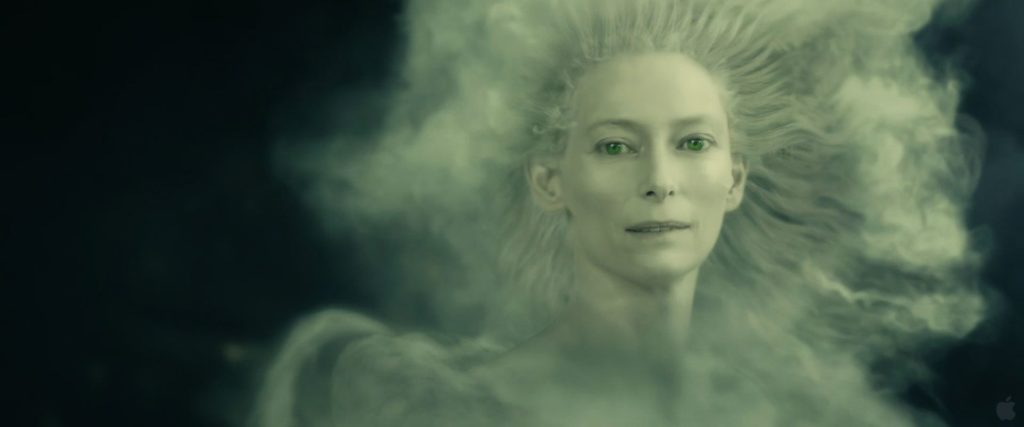Defeating Man-Centered Monsters With Greater Stories
How much God do we find in our visionary fiction? Is it wrong if He’s not there?
Or if we do find Him or a Christlike character in our stories, how would He best be portrayed?
All kinds of fiction include different degrees of involving God in their plotlines. Though I’m sure overlaps exist, I suggest one can break these down into four overall categories, like this:
- God-ignoring. This includes most secular stories, such as Star Wars, Harry Potter and most fairy tales I’ve heard. No one in these stories says “God does not exist”, but they also don’t affirm He does exist. Occasionally we might find story elements that seem to contradict the idea of God, such as The Force, but overall the story stays “neutral.”
- God-hating. Very few stories fill this category. I can only think of Pullman’s His Dark Materials books, which include “god” as a character, but certainly twist His nature and authority, and turn him into an enemy to defeat.
- God-centered. Unfortunately I suggest even fewer stories fit here, partly because many doctrine wonks who want to be God-centered aren’t the types of people to write fiction. By God-centered I don’t mean only including God by Name or as an active character, but also recognizing that He does all things, not just out of love, but to glorify Himself; He has his own agenda and even “destiny,” to which all other characters, destinies, quests, etc., are naturally subject.But most stories labeled Christian seem to fit better into this category:
- God-including. This also includes many “secular” works such as Les Misérables, A Christmas Carol and Anne of Green Gables. Whether present as a parallel character in a fantasy world, or merely mentioned, God gets credit as an extra or even a supporting role. But who is the main star of the story? The human characters. In fantasy this often includes flawed people who must discover who they truly are, and often find the gifts/inheritance/talents/throne they’ve had all along. And any Christlike figure is there, mostly as a “sidekick,” to support this, with His own greater storyline not as important.
Please understand: I am not rejecting all stories that are mainly God-including. That’s because many Christians’ stories that are mainly God-including may drift into being God-centered. While all Christians have wrong ideas in their heads, the Holy Spirit may ensure true believers know and echo mainly truth even when they don’t know it. Similarly, I can enjoy God-ignoring stories for the truths their authors incidentally embed, whether it’s simple love-friendship-and-sacrifice, or more-direct hints such as Tolkien included (much of it by incident) in The Lord of the Rings.
For the Christian, the choice seems easy between God-rejecting and God-centered stories. But if I had to choose between stories that ignore God and those that (despite frequent hints of God-centeredness) most often include Him, I must admit I would prefer the God-ignoring ones.

“Edmund … I can make you my king. I love you and have a wonderful plan for your life.”
Why? Because at least God-ignoring stories are not claiming to represent Christianity. Whether showing through story or telling more directly, they are not saying “this is what Christianity is” and then bait-and-switching. That would exchange the God-centeredness of more-potent Christianity — “God does all things for His glory, giving His perfect self to save even those who hated Him” — for the watered-down, more popular yet Pelagian worldview of “God’s main goal is to love you and help you Fulfill your Destiny.”
Still this may come across as slamming any author or story that doesn’t proclaim the whole Gospel on every page. But as I mentioned last week, I recognize not even the Bible does that!
However, the Bible’s big story — God created, man rebelled, God saves, God will restore — is clear to see amidst all the subplots involving heroes, battles, kings and fulfilled destinies.
Stories like this are far more amazing than the God-helps-person-follow-his-own-dream tales. Moreover, this will not only bring us more-Biblical stories that glorify God better as the main (though often hidden) Character, but better stories, free to explore what happens when God is on His throne and man is in his subservient yet joyous place, worshiping and following Him.
At Novel Journey, Noël De Vries presented this beautifully, regarding a certain fantasy film.
There is an essential difference between moralistic and Christ-centered storytelling. Every Hollywood film, no matter its source, preaches some degree of morality. Sometimes it’s obvious. Sometimes the filmmakers are more subtle, and create a desire within the viewers to emulate the hero. But either way, it’s about us summoning up the faith and courage to fight the giants in our lives.
In this film’s story, Eustace is pulled into Narnia so that he can overcome certain character defects, to help complete a mission and save hapless lives. Just like Frodo. Just like Harry. Just like Dorothy and Luke Skywalker. In the original story, however, Eustace is drawn into Narnia for one great adventure: Aslan saving him.
The men and women behind The Voyage of the Dawn Treader focus on good deeds and green mist and summoning strength because that’s the way storytelling works within their worldview.
But for a tale to be more than okay, you must replace the moralistic center. Heroic deeds flow naturally and painlessly, even poetically, from a cast that is anchored by the character of Aslan.
How to persuade well-meaning Christians that this way brings far greater joy? Point to Scripture’s own meta-story, rightly read, and always act according to God’s grace. We might also tell our own nonfiction stories — similar to how God may use fiction to point us to Him — about how we began seeing the man-centered monsters, in beliefs and stories, and heartily rejecting them in favor of the greater stories, mainly the Gospel of God’s Word, and thus began better reflecting the light of glory from His perfect joy in Himself. And specifically for Christian fiction readers and writers: we can also show more of this truth in the newer, better, more God-centered stories we may find.










































To put it another way, give us more stories written from a Christian world-view.
Stephen, a really thought-provoking post.
First, I don’t know where in your list of four, stories that utilize symbol would fall. You said
By that definition, Narnia is not God-centered, and I don’t think you believe that.
OK, I just re-read the quote, and I see that it’s possible you’re thinking that in Narnia “God” is an active character in the form of Aslan. I would argue that “God” is also an active character in Lord of the Rings, via Gandolf and Aragorn and even Tom Bombadill and Sam Gamgee. It’s a different way of making people mindful of God. (And don’t forget, Tolkien called his work “very Catholic”—many people believe he included Mary in the story.)
But for discussion’s sake, how about if we add a Symbolically God-centric category? If we do that, then I think we need to include a Symbolically God-hating category as well. I’ll also add that I think that should read “anti-the-one-True-God” category.
I’d say we need to put The Wizard of Oz in that latter category. Perhaps no family-friendly movie has done such a good job of promoting the “trust yourself, you have the power” philosophy you decry in Dawn Treader, even going so far as to debunk what should have been the god figure—ye ole wizard.
And while I’m thinking of it, if the Hate-God category is really the “Hate the True God” category, then Avatar belongs in it, for certainly god shows up and is even central. But how unlike God, that false idea!
So here’s my conclusion: we Christians should be thinking about all these movies, in the same way—measuring them by the Word of God. If Christians want more movies adapted from Christian books because then they’ll know they are safe, that’s a wrong motive and opens them to the worldview changes Hollywood will make. After all, we ought not expect non-Christians to understand or honor the Christian message, even when it is in front of them in the form of a book they are adapting.
But it troubles me that Christians seem to use a different standard for measuring a movie like Dawn Treader, from the one we use to measure a movie like Avatar. I don’t think we should be harder on a movie made from a Christian book but, I don’t think we should be easier either, and frankly, I’ve seen both extreme.
So there’s my two bits (price has gone up now that the economy is supposedly on the mend 😆 ).
Becky
Huh, I never got any of that out of the Wizard of Oz :lol:.
Well, that’s why the movie is so powerful, I think, Morgan. It doesn’t “preach,” but once you think about what it’s saying, it seems pretty clear. I remember the first time I heard the story (I think someone read it to me), I was soooooo disappointed in the wizard. I thought he really was all powerful and that he would be Dorothy’s answer. No. He was a fraud, pretending to be who he was not. But who else did I know who I thought to be all powerful? Only one Person.
In the end we discover that the Lion actually has had courage all along, the Scarecrow, brains, and the Tin Man, a heart. And Dorothy has the means within her to return home, she just has to believe. In what? Herself.
It’s a wonderful humanistic story, and a generation of kids who now believe that Man is good and God isn’t even around or if He is, He’s certainly not able to help us with our issues, grew up on just such fiction.
But too often we don’t take a close look at secular stories the same way we do Christian ones. We don’t look for their worldview, thinking they’re just telling us a good story, not telling us something to believe. Au contraire.
Becky
Fortunately I didn’t grow up with The Wizard of Oz and when I finally saw it much later in life, I really couldn’t see what the big deal was (though I’m sure it worked for its time). Now I have even more reason not to like it: the humanistic/Pelagianism all-that-you-need-is-inside-you, power-to-the-people propaganda. That’s exactly opposite the message of Christ-centered Christianity: you do not have what it takes, in fact, apart from Christ you are dead in your own sins and need new life.
Methinks that yes, those would be subsets of the two categories, God-centric and God-hating. Thus, Lord of the Rings would fit well into God-centered stories; though the one God (Iluvatar) is mainly included in The Silmarillion and even there he only makes brief appearances, it’s clear from the beginning that he is in charge and running a great “music” which no one can prevent.
(I’m also currently reading Steve Rzasa’s The Word Unleashed, which like most novels is almost 100 percent devoted to human characters. But it’s clear not from his ratio of “people parts” to “God parts” but from his emphasis, the story’s trajectory, Who is really running the show and that others’ stories are lesser compared with His.)
Conversely, many stories besides Pullman’s stuff might fit into the anti-god category, mainly because they redefine “god” and either treat him as the enemy (Pullman’s setup) or, as you noted with Avatar, redefine “god” as some kind of mystic panentheistic entity that’s sort-of worshiped, but still helps you fulfill your own destiny (thus overlapping into the “god”-including class). But that’s to be expected from a story written by non-Christians — it’s the novels and stories written by Christians that are mostly God-including rather than God-centered that disappoint me the most, and which would best be replaced by God-centered stories.
Does Lord of the Rings truly fit? Yeah, there’s a lot about destiny and fulfilling prophecies and such, but for the most part the characters act according to their natures or are corrupted by outside forces.
I read The Golden Compass as a fifth grader and didn’t think much of it. My child brain just wasn’t impressed, storywise.
Goes to show how powerful stories can be, even when they are not preachy (like Wizard of Oz). And makes us who write stories do the best that we can with the messages we are sending.
I think novels, by nature, aren’t “God-centered,” at least by the definition I’m understanding. God is not the main character of any of them, or it’d be a rather short book. I suppose I’d like to see an example of what you’d call “God-centered” and how it differs from “God-inclusive.” To be fair, though, I think I’d rather God not be “included” than see him misrepresented.
All Truth is God’s Truth, all stories are God’s story in a sense, saying one thing or another about him, through bad representations, or not, but still. I think I want to write stories that are not necessarily Christ centered, but Christ haunted, to take a term from Flannery O’Connor, herself a writer of worlds where God haunts every page, but is not always centered upon. I think this makes a good story. You won’t only find God in church, or the theologies of doctrine, but in the leaves that fall from a tree, and in the smile of your lover. If you’re able to see God that is. And not in a pantheistic sense, but a window sense.
Nice post. One of the things I learned talking to teens while writing my stories, is the great need for “hope” and the contrast between ‘false hope’ and ‘true hope’.
Those “God-ignoring” stories mentioned – Star Wars & HP – give a ‘false hope’ based upon human reasoning and invented world views. The kids I spoke to could see right through this and were deflated and empty in their quest to find ‘true hope’.
Whether in the God-centered or God-including story, if the Christian author can show a sharp contrast between man-made hope and divine hope that can be very effect tool for reaching people.
[…] Last week’s column may have left some wondering: how do we define “God-centered” stories versus stories that are merely “God-including”? I suggested that mainly entails recognizing that in the real-life story of our world, we must recognize that it’s we who fit into God’s agenda, not vice-versa. But that brings up a few questions: […]
[…] Our own Stephen Burnett had this to say about fantasy a number of years ago in his article “Defeating man-centered monsters with greater stories”: […]